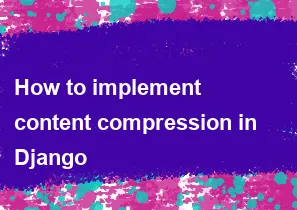How to implement content compression in Django

Content compression in Django can be implemented using middleware to compress the response content before it is sent to the client. Compression can significantly reduce the size of the data sent over the network, improving page load times and overall performance.
Here's a step-by-step guide on how to implement content compression in Django:
Install Middleware: Django provides a middleware called
django.middleware.gzip.GZipMiddlewarefor content compression. Ensure it is included in yourMIDDLEWAREsetting. Open yoursettings.pyfile and make sure the middleware is included:pythonMIDDLEWARE = [ # ... 'django.middleware.gzip.GZipMiddleware', # ... ]Configure GZipMiddleware: GZipMiddleware is quite configurable. You can specify the minimum size of the content to be compressed by setting the
GZIP_PAGE_SIZEsetting. For example, you can add the following to yoursettings.pyto set the minimum response size to 200 bytes:pythonGZIP_PAGE_SIZE = 200This means that responses smaller than 200 bytes won't be compressed.
Testing: After configuring the middleware, Django will automatically compress the response content if the client supports it. To test if compression is working, you can use browser developer tools or external tools like Google PageSpeed Insights or Lighthouse.
In your browser's developer tools, look for the
Content-Encodingheader in the response. If compression is successful, it should be set to "gzip."Optional: Custom Middleware (if needed): If you need more control over the compression process or want to implement your own compression logic, you can create a custom middleware. Here's a basic example:
pythonimport gzip from io import BytesIO class CustomCompressionMiddleware: def __init__(self, get_response): self.get_response = get_response def __call__(self, request): response = self.get_response(request) if "gzip" in request.META.get("HTTP_ACCEPT_ENCODING", "") and response.streaming_content: response.streaming_content = [gzip.compress(chunk) for chunk in response.streaming_content] response["Content-Encoding"] = "gzip" response["Content-Length"] = str(sum(len(chunk) for chunk in response.streaming_content)) return responseAdd this middleware to your
MIDDLEWAREsetting:pythonMIDDLEWARE = [ # ... 'path.to.CustomCompressionMiddleware', # ... ]Make sure to replace
'path.to.CustomCompressionMiddleware'with the actual path to your custom middleware.
Remember that compression is not always beneficial, especially for small responses or dynamically generated content. Always test and monitor the performance impact before and after implementing compression to ensure that it's providing the expected benefits for your specific application.
-
Popular Post
- How to optimize for Google's About This Result feature for local businesses
- How to implement multi-language support in an Express.js application
- How to handle and optimize for changes in mobile search behavior
- How to handle CORS in a Node.js application
- How to use Vue.js with a UI framework (e.g., Vuetify, Element UI)
- How to configure Laravel Telescope for monitoring and profiling API requests
- How to create a command-line tool using the Commander.js library in Node.js
- How to implement code splitting in a React.js application
- How to use the AWS SDK for Node.js to interact with various AWS services
- How to use the Node.js Stream API for efficient data processing
- How to implement a cookie parser middleware in Node.js
- How to implement WebSockets for real-time communication in React
-
Latest Post
- How to implement a dynamic form with dynamic field styling based on user input in Next.js
- How to create a custom hook for handling user interactions with the browser's device motion in Next.js
- How to create a custom hook for handling user interactions with the browser's battery status in Next.js
- How to implement a dynamic form with dynamic field visibility based on user input in Next.js
- How to implement a dynamic form with real-time collaboration features in Next.js
- How to create a custom hook for handling user interactions with the browser's media devices in Next.js
- How to use the useSWRInfinite hook for paginating data with a custom loading indicator in Next.js
- How to create a custom hook for handling user interactions with the browser's network status in Next.js
- How to create a custom hook for handling user interactions with the browser's location in Next.js
- How to implement a dynamic form with multi-language support in Next.js
- How to create a custom hook for handling user interactions with the browser's ambient light sensor in Next.js
- How to use the useHover hook for creating interactive image zoom effects in Next.js